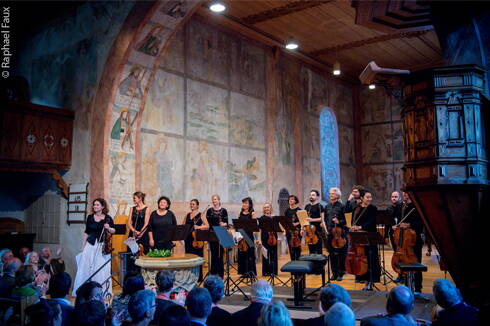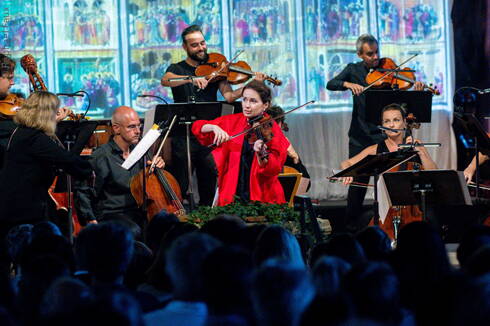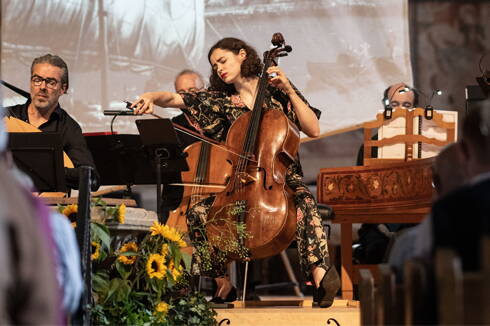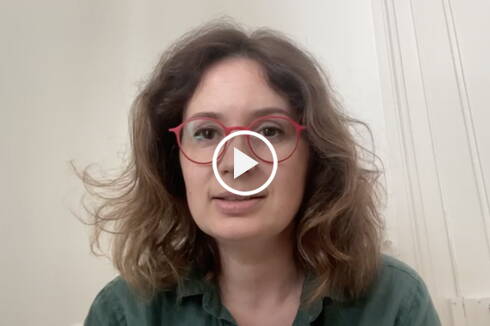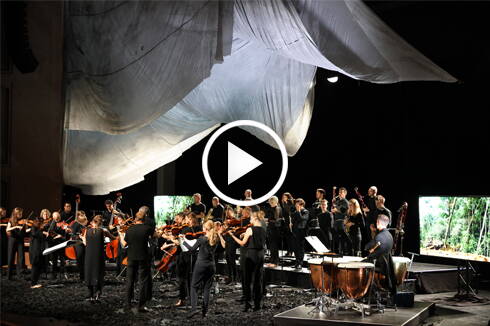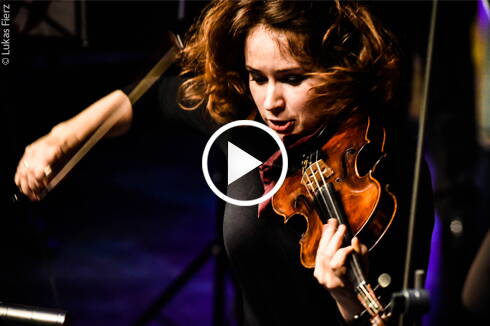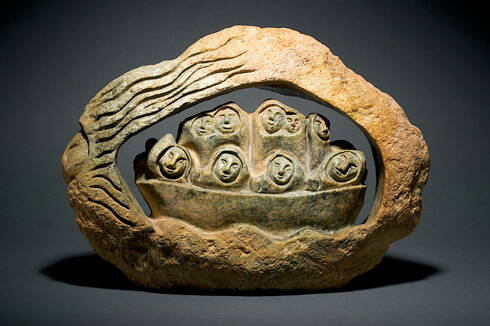Music for the planet
The 2023, 2024 and 2025 editions of Gstaad Menuhin Festival & Academy are dedicated to “Change”. The main topics of the three-year programme cycle will be accompanied by innovative concert creations from the laboratory of violinist Patricia Kopatchinskaja. During the three Festival editions, the concert series “Music for the Planet” presents programmes that are based on impressive and forceful messages about the state of nature, humanity, and society. The result is an overall artistic experience that goes far beyond the well-established concert formats.
In the festival edition 2025, two captivating concerts with vibrant music, paired with texts and visuals, will explore the multifaceted aspects of migration.
2025
An Inconspicuous Rebel
For the third year in a row, Patricia Kopatchinskaja brings an unflinching look at the state of the world with her “Music for the Planet” series. Since 2023, she has been curating the concerts as the series’ ambassador. While the past two editions focused more on the power of images, the 2025 concerts of the series shift to the impact of words. In a powerful exchange, the poetry and prose of Swiss author Franz Hohler – read in German by Meret Matter – will be paired with two chamber masterpieces by Dmitri Shostakovich. As Shostakovich crafted an intricate strategy of “inner emigration” to survive the moral pressures of the Soviet regime, his music became a symbol of artistic resistance. Together with her long-time collaborators, cellist Sol Gabetta and pianist Francesco Piemontesi, Kopatchinskaja brings these works to life in a thrillingly new way.
2025
Roots in the Exil
When images follow words … Marco Borggreve is a renowned photographer in the classical music scene. For this programme, his work engages in an inspiring dialogue with the sound worlds brought to life by Patricia Kopatchinskaja and the Camerata Bern in the second concert of this years “Music for the Planet” series. A concert that creates space for exchange and collaboration while symbolising unity. “The origin of our programme lies underground, but also in the sky”, explains Kopatchinskaja, together with cellist Thomas Kaufmann. “And most of all, in our hearts. The Polish composer Andrzej Panufnik believed that trees and their roots possess magical powers. Since his childhood, he had a special love for trees, admiring their many shapes and colors, the dancing of their branches in the wind, the rustling and sighing of the leaves. He imagined that their roots grow upward into the cosmos, while their branches reach deep into the earth. From this idea, fascinating short pieces for string orchestra were created, which we combine with images by Marco Borggreve, Schnittke’s Cello Sonata, Telemann’s “Frog” concerto and many more short nature fantasies by other composers.”
2024
Time and Eternity
In Patricia Kopatchinskaja’s “Time and Eternity”, the music revolves around pivotal moments of transformation, the aftermath of catastrophic wartime events, but also around hope. In 1939, Karl Amadeus Hartmann composed his Concerto funebre fueled by outrage and despair in response to the horrors of the Nazi regime, a threat that loomed over European civilization. The Concerto funebre can be understood as a passionate expression, a reflection on the suffering inflicted upon humanity, all living beings, the very essence of creation, and, by extension, the Creator (God?) himself. In his Polyptyque (a violin concerto composed in 1973 for Yehudi Menuhin), Frank Martin translated the Passion of Christ into music, drawing inspiration from images by Duccio di Buoninsegna (ca. 1255 – 1319) found on the reverse side of the renowned Maestà altarpiece in Siena. Frank Martin was deeply inspired by the Passion narrative, which conveys the idea that God empathises with the misery of temporal existence. According to Christian beliefs, His suffering leads to redemption in the Eternal – a beacon of hope in times of peril, including the challenges posed by climate change. The evocative musical meditation is accompanied by members from the Roman Catholic, Jewish, and Russian Orthodox communities, all of whom endured the brutality of the Nazi regime. The clergy from the Canton of Bern will share their perspectives on the event through short texts. Even if the narratives in their original languages are not fully understood, the concert gains rich significance through the perspectives: the Hebrew cantor will recite the Kol Nidrei, the Polish priest will offer a prayer, and the resurrection will be the touched upon in the speech of the Orthodox priest.
2024
Venezia and Beyond
It’s been three years since Anastasia Kobekina performed at our “Jeunes Etoiles” concert series on a Saturday morning in the Gstaad Chapel. Embraced by the audience, the cellist went on to win the “Jeunes Etoiles” Online Voting 2021 and has since become a regular at the Festival. What captivates is not just her exceptional sensitivity, but also her versatility across all musical styles — currently, she’s immersed in Baroque cello studies at the University of Music and Performing Arts Frankfurt. Her “Venezia and Beyond” programme is a true reflection of this diversity: Anastasia Kobekina, accompanied by the Kammerorchester Basel and directed by Julia Schröder, brings four centuries of music to Saanen – from Barbara Strozzi to Caroline Shaw, including delightful compositions by Antonio Vivaldi.
How do we link the events of the “Music for the Planet” concert series to the topic of “Transformation”? Venice, a city of yearning and dreams, a place with a rich musical history, yet it also signifies mortality as a location haunted by uncontrollable forces. In her homage to Venice, Anastasia Kobekina contemplates past and contemporary notes, exploring dreamlike images and the profound theme of the transience of this lagoon city, whose future is challenged by rising sea levels.
2023
Great Compositions and the Environment
In video messages, Patricia Kopatchinskaja compellingly highlights how the care for nature and society resonates in major works by composers such as Schubert, Beethoven, or Haydn. She also offers a glimpse into how she will bring the composers’ ideas to the stage through completely new and innovative audiovisual performances in the concerts “Les Adieux”, “Forelle”, and “Die sieben letzten Worte” as parts of her very own concert cycle "Music for the Planet".
2023
«Les Adieux»
In “Les Adieux”, Patricia Kopatchinskaja intones a scenic-musical lament for our endangered planet. It is time to say goodbye to the magnificent and sonorous flora and fauna that were the violinist’s first teachers of music if humans continue to act as they do now; but not without keeping the hope that the Paris Climate Agreement and the Agenda 2030 will be taken seriously. Kopatchinskaja interweaves Beethoven’s nature-inspired “Pastorale” with movements from Shostakovich’s First Violin Concerto, Robert Schumann’s Violin Concerto and his “Ghost Variations”. Combined with the stage design and video projections, a sword of Damocles hovers over the desperate lamentation in form of a large linen cloud, visualising approaching farewells.
2023
“Trout”
Schubert wrote his “Trout quintet” on the treacherously caught trout on a poem by Christian Schubart, who was caught for spreading revolutionary views from his exile in 1777 and incarcerated for years, in solitary confinement and with a ban of speaking. By writing the poem about the trout, he lamented his own fate in acoded way. Nowadays, we can read a parable for the maltreated nature from it. In this programme, the “TroutQuintet” is being put side to side to a new piece, which musically visualises the state of the polar ice, its inhabitants, and the impact of the increasing heat.
2023
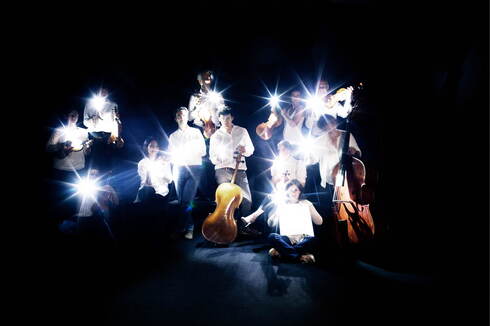
“The Seven Last Words”
The “Seven Last Words of Our Saviour on the Cross”, one of Haydn’s most demanding compositions, contains seven adagios with an introduction and a concluding presto. It says “Father, forgive them; for they know not what they do”, or “Eloi, Eloi, lama sabachthani”, or “I thirst”, or “I finished”: these words of Jesus, handed down in the movements, become a bitter reality for an increasing number of people, animals and plants. Haydn’s composition also is a passion of animate nature … “Father, into thy hands I commit my spirit!”
2023
Exhibition - Sedna
The thousand-year-old Sedna legend is about following rules that are imperative to survival. Sedna, the respected, feared, and honoured sovereign of the sea, the mother of sea mammals, punished humans who misbehaved by keeping the sea mammals in her hair until a Shaman combed it to release them.
Now, Sedna is portrayed in different roles, either helping humans deal with the rising waters due to melting ice, protecting them from extreme weather conditions, or her life is endangered due to pollution and the rising temperatures causing poisonous jellyfish to grow to a huge size.
2023
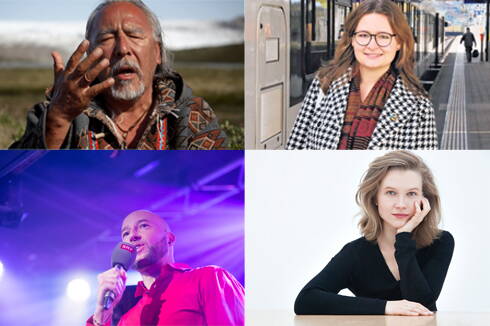
Panel Discussion
What can cultural practitioners achieve in the context of climate change?
To kick off the three-year concert series "Music for the Planet", the Gstaad Menuhin Festival investigates the responsibility of cultural organisers, musicians and the role of the performing arts in the face of climate change. Follow the exciting exchange between top-class artists and representatives from science and climate activism.
The discussion will be held in German and recorded for Gstaad Digital Festival.
Panelists: Marie Claire Graf (climate justice activist), Patricia Kopatchinskaja (violinist), Mirga Gražinytė-Tyla (conductor), Angaangaq (Inuit shaman - via video message) and Dr. Felix Keller (glaciologist).
Chair of the discussion: Moritz Weber
After the concert "Les Adieux" in the Festival Tent Gstaad



